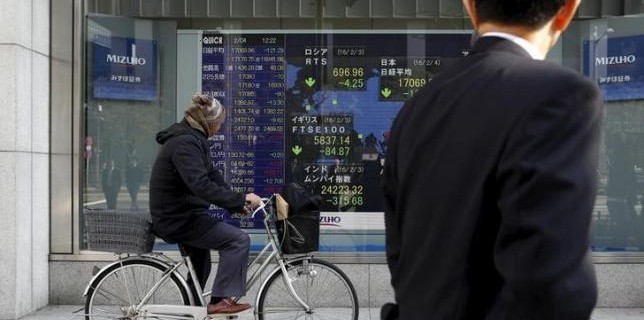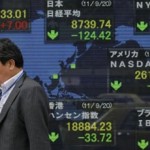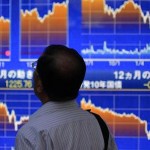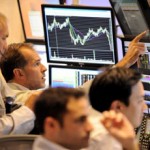Asian Stocks Slip Before Fed, BOJ as Yen Rises; Ringgit Slides

-
Copper drops as oil resumes gains; U.S. Treasuries advance
-
Malaysia’s currency slumps as state fund misses bond payment
Asian equities fell for a third day and copper dropped to a one-week low as investors shunned riskier assets ahead of central bank meetings in Tokyo and Washington this week. The yen and U.S. Treasuries advanced, while crude oil resumed gains.
Japanese shares led declines in the region as the yen strengthened for a second day. Malaysia’s ringgit tumbled the most in a month after a state-owned investment fund withheld an interest payment on its bonds, while New Zealand’s dollar was the best performer among major currencies. Copper fell for a second day, weighed down by rising inventories. West Texas Intermediate crude clawed back some of the last session’s 2.5 percent loss, which stemmed from renewed concern over a global glut.

The Federal Reserve will conclude its meeting on Wednesday and while no change in interest rates is expected, Bank of America Corp. sees scope for its comments to modestly boost the market’s assessment of prospects for a hike. The Bank of Japan’s outcome will be announced a day later and most analysts predict Governor Haruhiko Kuroda will announce a monetary stimulus boost amid Japan’s near-zero inflation. Quarterly earnings from Apple Inc. on Tuesday will shed more light on the state of the technology sector after results from Microsoft Corp. and Alphabet Inc. disappointed.
“Overall we’re in wait-and-see mode,” said Toshihiko Matsuno, chief strategist at SMBC Friend Securities Co. in Tokyo. “It’s easier for investors to lighten their positions so damage will be limited in case something unexpected happens in U.S. and Japanese monetary policy.”
Prime Minister Shinzo Abe’s economic adviser said Tuesday that this week’s meeting is the time for the BOJ to act if it wants to be preemptive, noting it’s possible that the authority will increase purchases of government bonds and exchange-traded funds. Twenty-three of 41 analysts surveyed by Bloomberg expect the monetary authority to expand stimulus at the coming review. Fed Funds futures reflect 20 percent odds of a rate hike at the Fed’s June meeting, and 34 percent by July.
Stocks
The MSCI Asia Pacific Index lost 0.9 percent as of 1:01 p.m. Tokyo time, led by declines in raw-materials producers. Japan’s Topix index sank 1.4 percent before earnings from companies including camera maker Canon Inc. and steel producer JFE Holdings Inc.
Hong Kong’s Hang Seng Index fell for a third day and the Shanghai Composite Index dropped to this month’s low. South Korea’s Kospi was little changed after data showed economic growth in the first quarter was in line with analysts’ estimates. Gross domestic product expanded 0.4 percent from the previous quarter, the Bank of Korea said Tuesday.
Futures on the Standard & Poor’s 500 Index erased earlier gains, while contracts on the U.K.’s FTSE 100 Index rose 0.2 percent.
“Markets will remain myopically focused on Thursday’s central bank extravaganza, with flows pushing us around until that point,” Mark Smith, a senior economist in Wellington at ANZ Bank New Zealand Ltd., said in a client note. “The Fed will choose its words carefully and has proven reasonably adept of late at keeping the market on an even keel despite tricky policy trade-offs.”
Currencies
The yen strengthened 0.2 percent to 110.93 per dollar after appreciating 0.5 percent in the last session, when it touched a three-week low of 111.91. Nikkei newspaper reportedthat Japan’s $1.3 trillion Government Pension Investment Fund will start hedging to protect its foreign assets against an appreciating yen, a move Bank of America Merrill Lynch strategist Shusuke Yamada said could boost the local cur
The ringgit dropped 0.8 percent, its biggest loss since March 24. 1Malaysia Development Bhd. said it didn’t pay $50 million of interest on a $1.75 billion bond amid a dispute with Abu Dhabi’s sovereign wealth fund on who should be making the payment. The latter is the co-guarantor of the defaulted securities and said this month it was owed more than $1 billion by 1MDB.
New Zealand’s dollar climbed 0.3 percent to 68.75 U.S. cents after a group of academics, business people and economists put together by the New Zealand Institute of Economic Research and known as the central bank’s shadow board, said the Reserve Bank of New Zealand should hold its key rate at 2.25 percent when it meets on Thursday. Three of 16 economists surveyed by Bloomberg forecast the RBNZ will lower borrowing costs.
“The risk of another surprise rate cut by the RBNZ suggests the New Zealand dollar is at risk against the U.S. dollar at current levels above 68.50 cents,” said Mansoor Mohi-uddin, a Singapore-based strategist at Royal Bank of Scotland Group Plc. “The Federal Reserve meets the day before, but is unlikely to sound any more dovish on the outlook for U.S. monetary policy.”
Commodities
Copper dropped 1 percent in London. Stocks in London Metal Exchange warehouses expanded to 152,400 tons on Monday, the highest volume since March 23, in a sign that supply may be exceeding demand. Nickel, zinc and lead declined by 0.6 percent or more.
WTI rose 0.3 percent to $42.76 a barrel, after falling on Monday for the first time in a week. U.S. crude stockpiles probably expanded by 1.5 million barrels last week, according to a Bloomberg survey before Energy Information Administration data on Wednesday. Oil markets are signaling that prices have bottomed, even as growth in demand is forecast to slow this year, according to a senior executive at Vitol Group, an energy trader.
“Oil is looking more and more solid above the $40 mark but it does seem momentum has slowed,” Angus Nicholson, an analyst at IG Ltd. in Melbourne, said by phone. “There are still concerns about the oversupply and the market re-balancing is certainly not happening just yet.”
Bonds
U.S. Treasuries advanced, pushing the 10-year yield down by two basis points to 1.895 percent. The rate ended Monday at the highest level in a month, underscoring speculation that the Fed will keep its outlook for gradual rate increases.
1MDB’s dollar bonds due 2023 fell, pushing their yield 74 basis points higher to 6.90 percent, according to data compiled by Bloomberg. Malaysia’s 10-year sovereign notes also declined and the cost to insure the nation’s government debt using five-year credit-default swaps rose to a seven-week high.
Source: Bloomberg





























